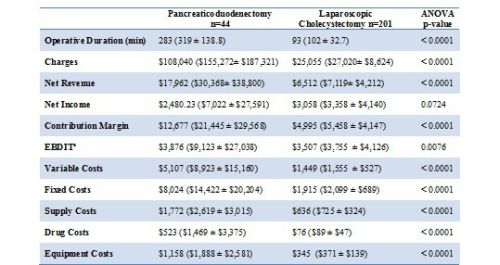|
Back to 2015 Annual Meeting Program
What Are the Financial Implications of Centers for Regional Healthcare?
Alexander S. Rosemurgy*, Richard Klein, Carrie E. Ryan, Prashant Sukharamwala, Kenneth Luberice, Sharona B. Ross
General Surgery, Florida Hospital Tampa, Tampa, FL
Introduction: Financial implications on regionalization of healthcare and programmatic development are not often considered. We undertook this study to evaluate and compare hospital cost of care and income with a common operation (laparoscopic cholecystectomy) versus an operation often associated with HPB programmatic development and healthcare regionalization (pancreaticoduodenectomy).
Methods and Procedures: The charges and reimbursements of all laparoscopic cholecystectomies (n=201) and pancreaticoduodenectomies (n=44) at one hospital undertaken from June 2012 to June 2013 were determined. Comparisons were undertaken using ANOVA with significance accepted at p ≤ 0.05. Data are reported as median data or as median (mean ± SD).
Results: Pancreaticoduodenectomy, relative to laparoscopic cholecystectomy, had greater time in the operating room (283 min vs. 93 min), hospital charges (\,040.87 vs. \,055.85), and hospital costs (\,482.15 vs. \,453.78) (p<0.0001 for each), but generated similar income (\,480.23 vs. \,058.83, p=0.88).
Conclusions: Pancreaticoduodenectomy requires more resource allocation and costs hospitals more but leads to no more income. Many hospitals invest great effort and resources to build programs and centers for regional healthcare. However, their accounting systems are not based on cost accounting, but rather on complex formulas of cost allocation. Consequently, these accounting systems have great, and possibly inappropriate, impact on perceived income associated with care. Considering these systems, it seems hospitals derive more return on investment from commonly undertaken operations than those often associated with regionalization of healthcare and programmatic development. Accounting systems need to reflect actual costs to allow determinations of actual income to better allocate healthcare resources and to seek appropriate compensation for hospital care.

Back to 2015 Annual Meeting Program
|


